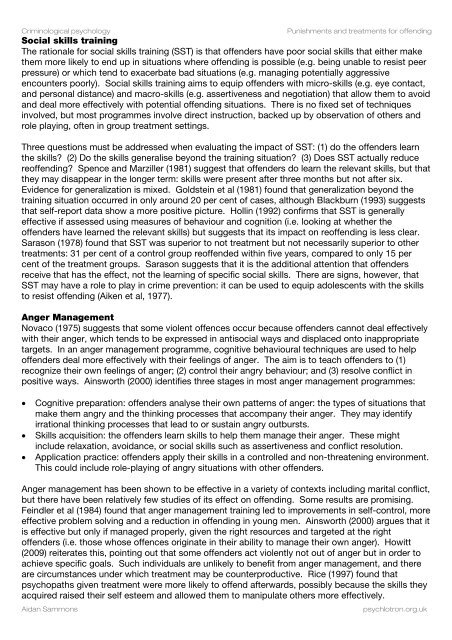Psychological treatments for offending - Psychlotron Teaching ...
Psychological treatments for offending - Psychlotron Teaching ...
Psychological treatments for offending - Psychlotron Teaching ...
You also want an ePaper? Increase the reach of your titles
YUMPU automatically turns print PDFs into web optimized ePapers that Google loves.
Criminological psychology<br />
Aidan Sammons<br />
Punishments and <strong>treatments</strong> <strong>for</strong> <strong>offending</strong><br />
Social skills training<br />
The rationale <strong>for</strong> social skills training (SST) is that offenders have poor social skills that either make<br />
them more likely to end up in situations where <strong>offending</strong> is possible (e.g. being unable to resist peer<br />
pressure) or which tend to exacerbate bad situations (e.g. managing potentially aggressive<br />
encounters poorly). Social skills training aims to equip offenders with micro-skills (e.g. eye contact,<br />
and personal distance) and macro-skills (e.g. assertiveness and negotiation) that allow them to avoid<br />
and deal more effectively with potential <strong>offending</strong> situations. There is no fixed set of techniques<br />
involved, but most programmes involve direct instruction, backed up by observation of others and<br />
role playing, often in group treatment settings.<br />
Three questions must be addressed when evaluating the impact of SST: (1) do the offenders learn<br />
the skills (2) Do the skills generalise beyond the training situation (3) Does SST actually reduce<br />
re<strong>offending</strong> Spence and Marziller (1981) suggest that offenders do learn the relevant skills, but that<br />
they may disappear in the longer term: skills were present after three months but not after six.<br />
Evidence <strong>for</strong> generalization is mixed. Goldstein et al (1981) found that generalization beyond the<br />
training situation occurred in only around 20 per cent of cases, although Blackburn (1993) suggests<br />
that self-report data show a more positive picture. Hollin (1992) confirms that SST is generally<br />
effective if assessed using measures of behaviour and cognition (i.e. looking at whether the<br />
offenders have learned the relevant skills) but suggests that its impact on re<strong>offending</strong> is less clear.<br />
Sarason (1978) found that SST was superior to not treatment but not necessarily superior to other<br />
<strong>treatments</strong>: 31 per cent of a control group reoffended within five years, compared to only 15 per<br />
cent of the treatment groups. Sarason suggests that it is the additional attention that offenders<br />
receive that has the effect, not the learning of specific social skills. There are signs, however, that<br />
SST may have a role to play in crime prevention: it can be used to equip adolescents with the skills<br />
to resist <strong>offending</strong> (Aiken et al, 1977).<br />
Anger Management<br />
Novaco (1975) suggests that some violent offences occur because offenders cannot deal effectively<br />
with their anger, which tends to be expressed in antisocial ways and displaced onto inappropriate<br />
targets. In an anger management programme, cognitive behavioural techniques are used to help<br />
offenders deal more effectively with their feelings of anger. The aim is to teach offenders to (1)<br />
recognize their own feelings of anger; (2) control their angry behaviour; and (3) resolve conflict in<br />
positive ways. Ainsworth (2000) identifies three stages in most anger management programmes:<br />
• Cognitive preparation: offenders analyse their own patterns of anger: the types of situations that<br />
make them angry and the thinking processes that accompany their anger. They may identify<br />
irrational thinking processes that lead to or sustain angry outbursts.<br />
• Skills acquisition: the offenders learn skills to help them manage their anger. These might<br />
include relaxation, avoidance, or social skills such as assertiveness and conflict resolution.<br />
• Application practice: offenders apply their skills in a controlled and non-threatening environment.<br />
This could include role-playing of angry situations with other offenders.<br />
Anger management has been shown to be effective in a variety of contexts including marital conflict,<br />
but there have been relatively few studies of its effect on <strong>offending</strong>. Some results are promising.<br />
Feindler et al (1984) found that anger management training led to improvements in self-control, more<br />
effective problem solving and a reduction in <strong>offending</strong> in young men. Ainsworth (2000) argues that it<br />
is effective but only if managed properly, given the right resources and targeted at the right<br />
offenders (i.e. those whose offences originate in their ability to manage their own anger). Howitt<br />
(2009) reiterates this, pointing out that some offenders act violently not out of anger but in order to<br />
achieve specific goals. Such individuals are unlikely to benefit from anger management, and there<br />
are circumstances under which treatment may be counterproductive. Rice (1997) found that<br />
psychopaths given treatment were more likely to offend afterwards, possibly because the skills they<br />
acquired raised their self esteem and allowed them to manipulate others more effectively.<br />
psychlotron.org.uk
















